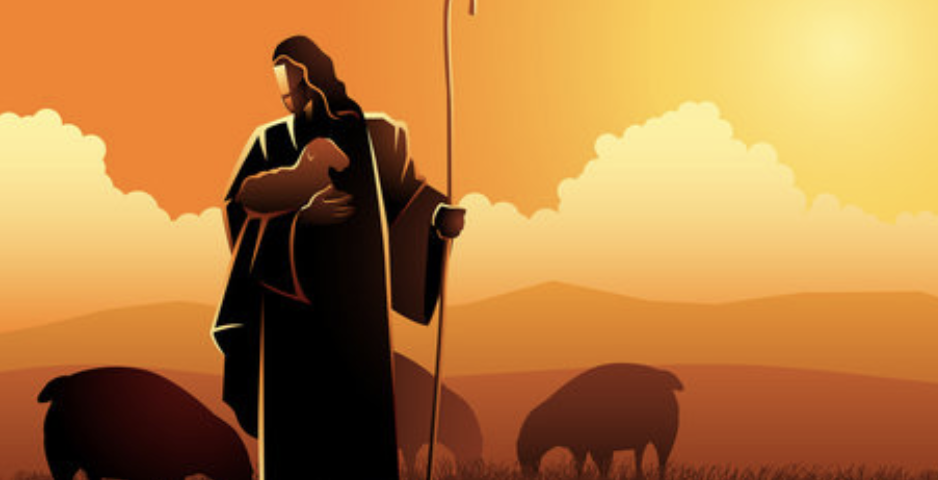As the holiday season passes, inevitably the character of a shepherd was visible, from manager scenes, to Christmas ornaments. We don’t have many true shepherds around here, in the sense of livestock related. In the day shepherds were very common.
When we look at the bible the role of a shepherd is paramount. If just pause for a moment and recall the history of the Old Testament, the sacrificial offerings were blood atonement for sin, from unblemished animals. These animals did not just roam around freely, they were raised and cared for. Shepherds in the day were an important part of the lives of the Israelites.
Let me set this before you as plainly as I can. If a person climbs over or through the fence of a sheep pen instead of going through the gate, you know he’s up to no good—a sheep rustler! The shepherd walks right up to the gate. The gatekeeper opens the gate to him and the sheep recognize his voice. He calls his own sheep by name and leads them out. When he gets them all out, he leads them and they follow because they are familiar with his voice. They won’t follow a stranger’s voice but will scatter because they aren’t used to the sound of it. – John 10:1-8 MSG
What are some of the initial thoughts or messages that you get after this simple parable?
Jesus used the parable to help us understand who He was and what He wants to do for us. This portion of the Bible grew from the Jesus’ confrontation with the Jewish leaders in the previous chapter (remember context and situation). Jesus used the concept of light and darkness, and now He changes the image to a shepherd and sheep. To the Jewish people a shepherd was a kind of leader, spiritual and political. Today would most likely not associate a shepherd as a leader, but more of a laborer. In the days of the writing, people looked to the king and prophets as shepherds.
There can be leaders in many different groups, there are leaders of gangs, leader of bad people, and of course leaders of respectable people. Jesus uses this story to illustrate what happened in chapter 9 when the leaders of the synagogue kicked the beggar out. They were the shepherds of the religious church. The false shepherds did not care for this man; instead, they mistreated him and threw him out. But Jesus came to him and took him in.
What are some of the characteristics of good leaders in your life? Have you had good leaders? Have you have bad leaders?
Many times this parable is used to denote the goal of getting into heaven, which has a use, but was not the objective of Christ at the time. Jesus was teaching his disciples about the challenges here on earth. Each of us have a similar challenge today. How do we live out our days on earth, how do we maneuver through the mess of our day to day lives.
Let’s look at the scripture now with better insight….
“I tell you the truth, anyone who sneaks over the wall of a sheepfold, rather than going through the gate, must surely be a thief and a robber! 2 But the one who enters through the gate is the shepherd of the sheep. 3 The gatekeeper opens the gate for him, and the sheep recognize his voice and come to him. He calls his own sheep by name and leads them out. 4 After he has gathered his own flock, he walks ahead of them, and they follow him because they know his voice. 5 They won’t follow a stranger; they will run from him because they don’t know his voice.”
6 Those who heard Jesus use this illustration didn’t understand what he meant, 7 so he explained it to them: “I tell you the truth, I am the gate for the sheep. 8 All who came before me were thieves and robbers. But the true sheep did not listen to them. – John 10:1-8 NLT
Key things to realize:
- Who comes through the gate?
- Who is in the pen?
How do you know the voice of someone?
How does one make the best counterfeit money?
For use to know the shepherd of our life, we need to know who He is. Each of us have probably had times when we realized we were being influenced and lead but the wrong shepherds.
Some key attributes we can get from the message of Christ
- Jesus came to protect the flock, not slaughter it. He actually came and laid his life down for the sheep, not offer the sheep for himself.
- Those that do not know Christ, do not follow Christ. They don’t know his voice
When sheep refuse to follow the shepherd, they go astray; they face the possibility of being killed by other animals. As long as we remain in Christ, and He in us, no harm can come to us. If we stray from Him, we forfeit His protection and guidance; let’s follow our Shepherd closely. Let us be attentive to which voice we are following. In these times we are all prone to the being persuaded by good words and shallow promises. Let’s be wise and stay connected to a relationship with the true shepherd so we can continue to here His voice and follow His direction, not be mislead, mistreated and abandoned and slaughtered for the benefit of false shepherds.
Peterson, E. H. (2005). The Message: the Bible in contemporary language (Jn 10:1–5). Colorado Springs, CO: NavPress. Tyndale House Publishers. (2015). Holy Bible: New Living Translation (Jn 10:1–8). Carol Stream, IL: Tyndale House Publishers. Pentz, C. M. (1980). Outlines on the Parables of Jesus (p. 9). Grand Rapids, MI: Baker Book House.
